SEOUL — South Korea is many things; a driver’s paradise is not one of them. The roads are mostly flat and straight, and their level of speed regulation is borderline draconian – like, to the point where a multi-hour drive on a freeway becomes a neverending slog to appease what feels like a billion speed cameras. On top of that, traffic is always congested. Always. Hoot and a half, let me tell ya.
But behind the wheel of a 2024 Hyundai Santa Fe, none of this stuff matters. Hyundai’s redesigned midsize SUV is a quiet, comfortable and surprisingly luxurious steed that makes freeway crawls a non-issue. It’s not half bad on a backroad, too.
The new Santa Fe’s basic checklist hasn’t changed for this latest generation – seating for seven, all-wheel drive, loads of tech, optional hybrid power – but its overall shape is quite different. Hyundai really butched this one up, to the point where Land Rover comparisons are not unwarranted. Seriously, it looks more like a Land Rover Discovery than the actual Land Rover Discovery.
By the tape measure, the 2024 Santa Fe isn’t that much larger than its predecessor, only growing 1.8 inches in length and 1.4 inches in height (their widths are identical). But goodness, does the new Santa Fe have a whole lot more curb appeal. You definitely need the larger 21-inch wheels to really fill out those generous wells, as the standard 18s can look a little puny.
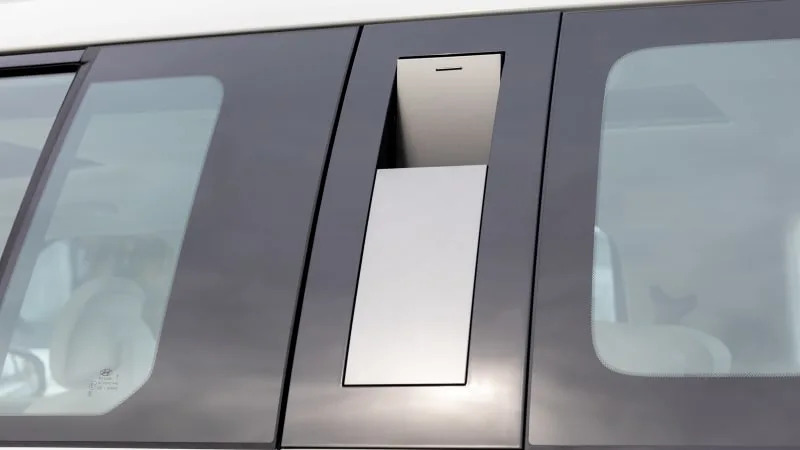
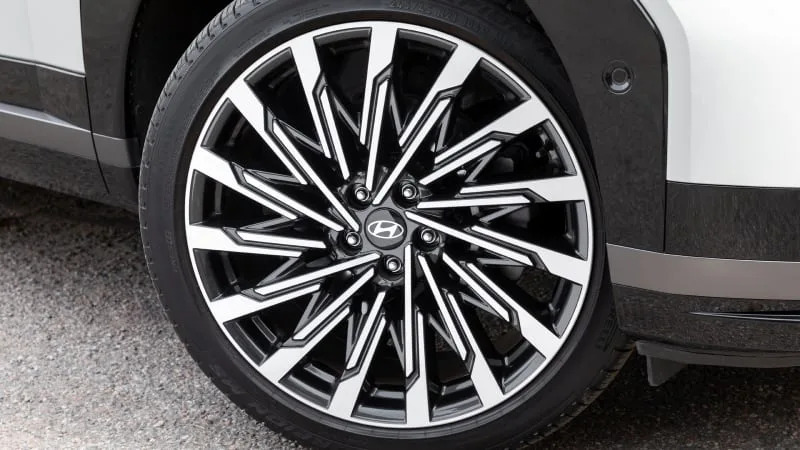
Don’t worry, U.S.-spec Santa Fes will have tinted rear windows, unlike the Korean-market tester pictured here – another upgrade that not only improves things cosmetically but helps to keep the cabin cool. Once inside, you’ll find generous accommodations for first- and second-row passengers, with that boxy design lending itself to mega headroom. Getting into the third row is kind of a hassle, since the seats don’t slide forward enough, but once you manage to wedge yourself back there, the amount of space available seems comparable to what you’d find in the considerably larger Palisade (196.7 inches long versus the Santa Fe at 190.2). The remaining cargo space behind it is another story – it’s tiny with all seats raised, much like the mechanically related Kia Sorento that has similar exterior dimensions. If that’s a problem, loading extra stuff on the raised roof rails is uniquely aided by grab handles in the C pillars that help you hoist yourself up while standing on the rear tire.
If you thought the Santa Fe’s exterior looked a little Defender-y, the cockpit will give you the same impression. The steering wheel looks like it was ripped right out of a Land Rover, as do the squared-off air vents and angled climate control screen flanked by temperature dials for the driver and passenger. The large center console area has two dedicated wireless charging pads for a pair of smartphones (an extreme rarity, in fact we’re struggling to think of another), and the cubby under the armrest opens from either the front or back, which sounds cool and functional, but you have to give the lid a good hard pull to get it to unlatch. This isn’t a weird pre-production quirk, either.
A curved display houses a pair of 12.3-inch screens, one for the gauges and another for the Hyundai Group’s latest multimedia system that gets wireless Apple CarPlay and Android Auto among other upgrades and updates. To the right, there are two gloveboxes: a top one behind the dash panel and a more traditional one by the passenger’s knees. This is in addition to deep door pockets that’ll hold huge water bottles and storage space under the center console, as well.
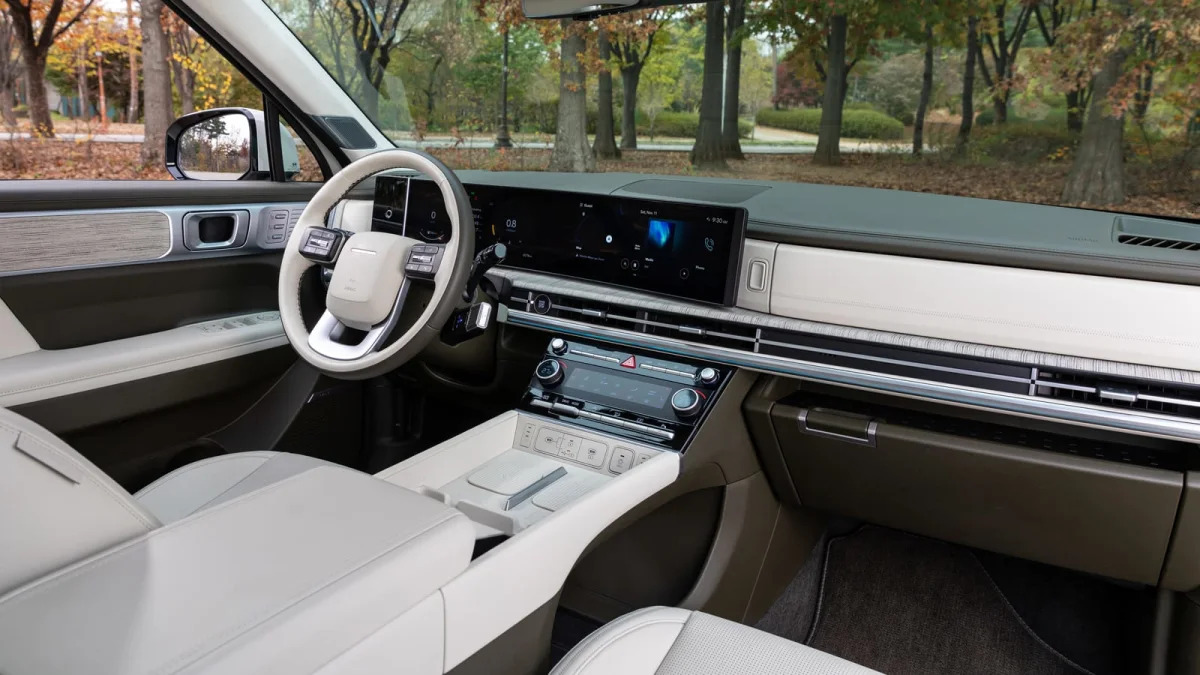

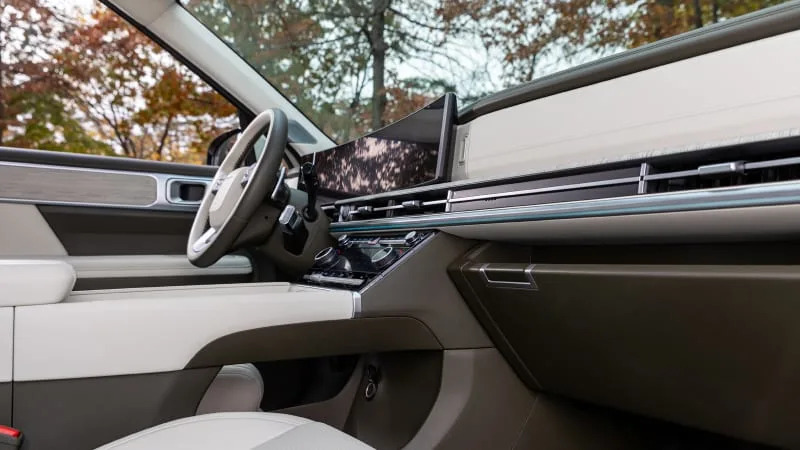
While global markets will be treated to an array of powertrain options, including a diesel and a plug-in hybrid, we’ll only get two choices in North America. First up is the 2.5-liter turbocharged inline-four and eight-speed dual-clutch automatic combo that’s used in the Santa Cruz pickup as an upgrade, making 277 horsepower and 311 pound-feet of torque. If you’re looking for something more efficient, Hyundai will offer a hybrid powertrain consisting of a 1.6-liter turbo-four engine, small electric motor and six-speed automatic, putting out 232 hp and 271 lb-ft. That’s 6 hp and 13 lb-ft more than the otherwise similar powertrain found in the one-size-down Hyundai Tucson Hybrid. Official fuel economy numbers won’t be available until closer to the Santa Fe’s on-sale date in March 2024, and no, Hyundai isn’t planning to replace the current Santa Fe PHEV for the United States.
Slumming it in Seoul traffic, both engine options offer smooth power delivery and enough oomph to get the Santa Fe out of its own way. But at higher speeds – or if you find a winding side-road – the less-powerful hybrid setup can occasionally feel anemic, especially during mid-range acceleration. The more powerful 2.5-liter turbo setup really feels like the best option, able to move the large Santa Fe with greater confidence. It doesn’t sound half-bad, either.
Hyundai will offer front- and all-wheel-drive Santa Fe models in America. And while the SUV’s rugged good looks might give you the impression that this thing can off-road like a Land Rover, do not be fooled. Sure, there’ll be a rugged-ish Santa Fe XRT variant that gets 30-inch all-terrain tires and an additional 1.4 inches of ground clearance (the total number has not been released, oddly). That’s a lot more than other Hyundai XRTs, which are glorified appearance packages, but this unibody crossover still won’t have any kind of proper rock-crawling or mud-slinging chops. The Santa Fe has hill-descent control, but that’s it.
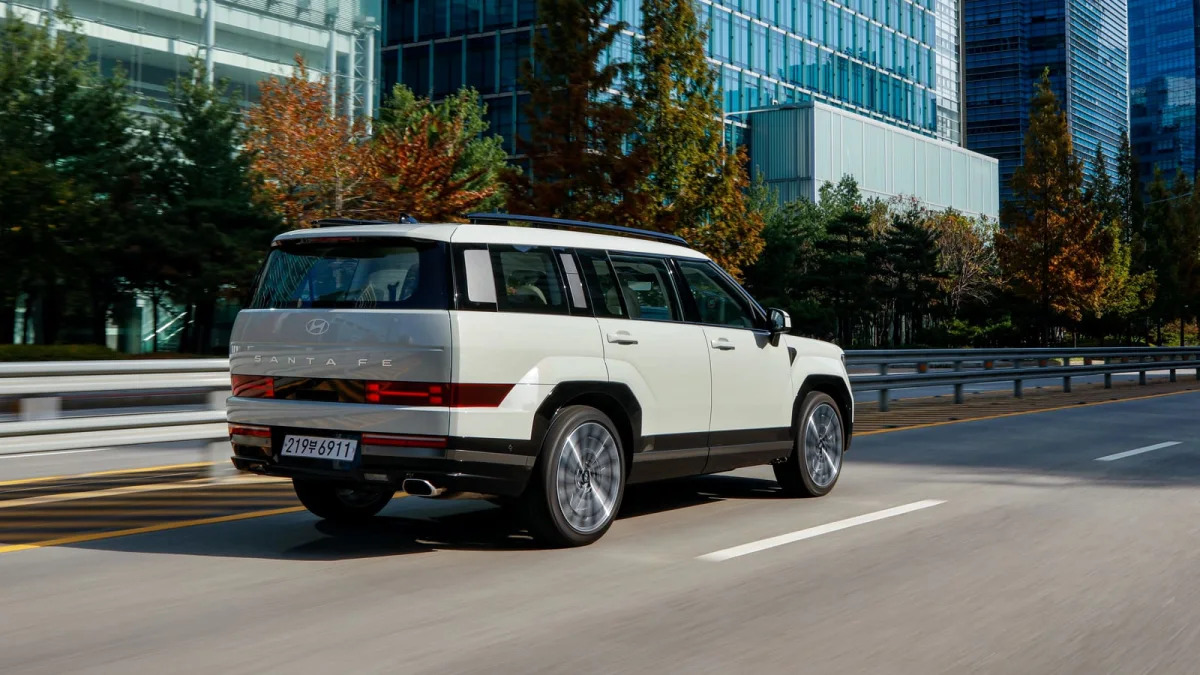
On paved roads, the Santa Fe is plenty nice to drive, with decent steering and controlled body manners. You sit high behind the steering wheel and there’s a commanding view down the long, flat hood that – yep – kind of has a Land Rover vibe. Fitted with 21-inch wheels, the Santa Fe translates every little bump and blemish through to the cabin, but the smaller 18-inch wheels and higher-sidewall tires smooth things out beautifully. This obviously presents a quandary given that whole “looks better on 21s” thing. I didn’t get to drive the XRT, either, so we’ll have to wait and see how much its all-terrain tires degrade the ride and handling.
Long stints of hella-dull Korean highway cruising mean Hyundai’s Smart Cruise Control 2 system has plenty of time to shine, though this tech isn’t perfect. The lane-centering system has a tendency to ping-pong the SUV between either side of the chosen lane, and the lane-change assist isn’t proactive, like with General Motors’ Super Cruise. You still have to signal to engage an auto lane change.
Small nitpicks aside, the new Santa Fe is a damn fine SUV for daily driving, and comes with all the technology and creature comforts buyers in this segment expect. Hyundai won’t release final pricing figures for a few more months, but the new Santa Fe’s MSRP shouldn’t stray too far from the current model’s range, starting around $30,000 and reaching up to $45,000 for a fully loaded Calligraphy.
Beyond its inherent good graces and competitive pricing, however, the single biggest thing that’ll help the new Santa Fe stand out is its styling. Big and boxy are all the rage once again, and this increased focus on visual punch definitely turns heads on the streets of Korea. I fully expect it to have the same effect in SUV-hungry America.
Related video:
